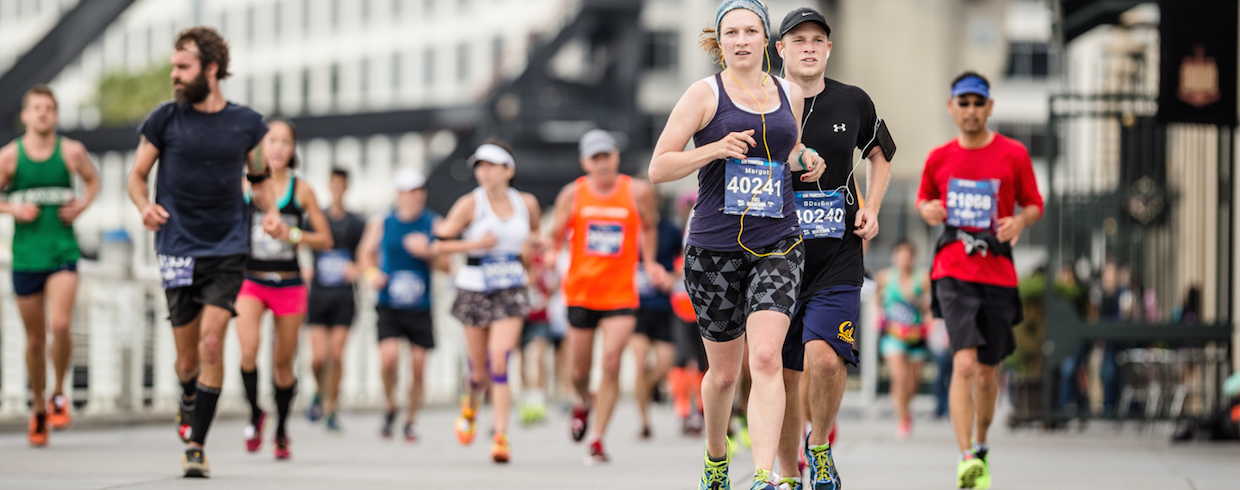Train Well 3: Eating During a Marathon Myth, by Dr. Jeff (Advice from the Medical Tent)
Does consuming calories during a marathon improve performance? Physiology’s answer is no.
Facts:
- 2,000 calories of carbohydrate (glucose in glycogen) are stored in the body (1,600 calories in muscle, and 400 calories in liver).
- 110,000 calories of fat (3 fatty acids in triglycerides, released by Lipase) are stored in the body (2,700 calories in muscle, and 108,000 in adipose tissue).
- During intense exercise (sprint), one glucose (without oxygen) produces 2 ATP. Since ATP is the only direct source of energy for muscle contraction and is depleted in 5 seconds, the winner of a 100-meter sprint (lasting 10 seconds) is the competitor that tires the least.
- Training increases the number and size of mitochondria (cell structures producing ATP using oxygen) in muscle allowing more fat use as fuel (see blog 6/11/18: TW 1, Carb Loading Myth). During moderate intensity exercise (distance running), mitochondria produce 30 ATP from one glucose and 108 ATP from one fatty acid (palmitate).
- At the beginning of a marathon, muscles use 50% fat and 50% glucose for fuel. During the marathon, fat use increases and glucose use decreases.
- Eating increases insulin levels which inhibits Lipase (reducing the amount of fat available for muscles) and drives glucose into cells to form glycogen (with leftover glucose forming fat). While muscles are using glycogen during exercise, they cannot absorb glucose.
Conclusion
Since fat stores will never be depleted, marathoners do not need to consume calories. Since eating increases insulin levels for 3 hours, eating within 3 hours of the start will also reduce fat availability as fuel for muscles. Running empty will reduce the incidence of stomach upset.
Wishing you healthy organs,
Jeff
Stay Tuned For: Train Well 4: Final Biofreeze SF Marathon advice – Run happy, safe, empty. Food, fluid, pills.
Put this advice to work at The 2018 Biofreeze San Francisco Marathon! #ThisIsHappening
“If I can motivate an attendee/reader to change a habit to improve their health, it makes my day job easier.” – Dr. Jeff Shapiro
A graduate of Yale & Stanford, Jeff coaches (since 1993) those seeking peak wellness through science. Jeff appeared on ABC News 20/20 (“Super Humans”), and consulted for CBS News 60 Minutes (“The Toughest Race”) and The Late Show with David Letterman. Jeff has completed 50 marathons, served as medical director for the San Francisco Marathon, and lectured at numerous organizations, including Google, B of A, Merrill Lynch, and SanDisk.
Save the Date!
Join Jeff at the next Golden Gate Relay – California’s Longest Party, held the first weekend in May. In the long run (walk or ride), organ donation saves lives!
Gather 12 friends/2 vans. Dress your best (costumes/decorated vans optional). Walk (125 miles, 6-12 walkers), run (125, 160 or 190 miles, 6-12 runners), or ride (30, 65, 130 or 190 miles, 1-3 riders). Support 125,000 Americans waiting for organs as a runner, walker, rider, volunteer or organ donor!



Ilias M
July 18, 2018 (8:20 pm)
Does this include carb gels too?
Susan Levine
July 20, 2018 (3:59 pm)
Are you saying that we shouldn’t consume electrolyte gu, jelly beans, etc.?
Bruced
July 21, 2018 (7:50 pm)
If we accept this logic, then I see no reason why it would not also apply to a 100 mile ultra. You would still have plenty of fat calories to spare.
Fatima
July 24, 2018 (4:19 pm)
Great information. Thank you!
David
July 25, 2018 (10:20 am)
Am I the only one who thinks this advice is quite insane? Maybe it works for an elite runner like Dr. Jeff, who has done over 50 marathons. For me as a novice runner, I think it would be suicidal not to eat any calories during a marathon. What about hitting the wall after 18-20 miles?
Liz I
July 27, 2018 (11:22 am)
I know it seems contrary to intuition and what marketers espouse, but what I like about Dr. Jeff is he presents just the sound science regarding what happens in the body’s systems. Plus, he sees who ends up in the medical tent.
M
July 29, 2018 (8:10 pm)
What’s not in Dr Jeff’s analysis is consideration of speed. You can’t go fast burning fat. What you will do is start “consuming” your muscles. This releases a toxin into your bloodstream and you will get sick if you persist over-exerting yourself. It’s called Rhabdomyolysis. Ultra runners are familiar with it. It’s what causes dark urine after your fast marathon. You can get away with it in a marathon, which is presumably what Dr Jeff is focused on here.